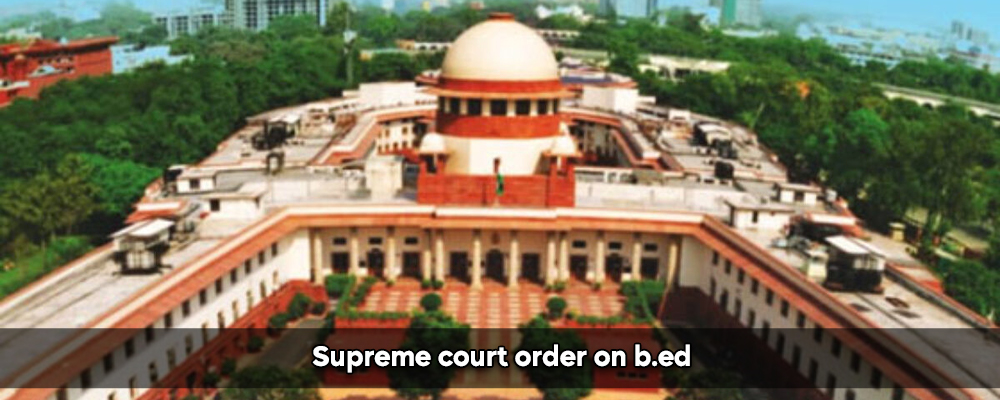While deciding the case of Devesh Sharma v Union of India ( civil appeal No. 5068 of 2023), the Supreme Court upheld the judgement given by the Rajasthan High Court which decided that the B.ed degree holders would not be eligible for the post of primary school teachers. The Supreme Court opined that the B.Ed. degree holders did not pass the basic professional threshold which is required for teaching students of the primary classes and therefore will not be able to ensure ‘quality’ education to the children of primary school.
Need A Legal Advice
The internet is not a lawyer and neither are you. Talk to a real lawyer about your legal issue

Facts of the Case
- The dispute came into being due to the notification issued on 28.06.2018, which was issued by the National Council for Teacher Education (NCTE). The notification rendered the B.Ed. degree holders as eligible for their appointment to the post of primary school teachers. However, in spite of the above notification, in an advertisement by the Board of Secondary Education, State of Rajasthan, for Rajasthan Teacher Eligibility Test (RTET), B.Ed. degree holders were excluded from the list of eligible candidates, which was challenged before the Rajasthan High Court.
- Also diploma holders in Elementary Education (D.El.Ed.), who were the only teaching qualification necessary for teachers at primary level, challenged the inclusion of B.Ed. candidates. The government of Rajasthan supported the petition filed by these diploma holders.
- Rajasthan High Court decided against the NCTE notification quashing it and decided that B.Ed. candidates were not qualified for the posts of primary school teachers.
Arguments in the Supreme Court
- Senior Advocate PS Patwalia and Senior Advocate Meenakshi Arora represented the B.Ed. qualified candidates. It was argued that the High Court did not consider the fact that the notification came as a policy decision by the NCTE after the Central Government issued directions for the same and the High Court could not interfere with the policy decision taken by the Central Government.
- For the Diploma Holders and the State Government, Senior Advocate Kapil Sibal and Senior Advocate Dr. Manish Singhvi argued that the NCTE as an expert body is supposed to take an independent decision in this case, on the basis of the objective realities and should not just follow the directions given by the Central Government.
Judgement by the Supreme Court
- The Supreme Court referred to the right to free and compulsory education for children in India and referred to it as a part of the ‘social vision’ of the framers of the Indian Constitution. The court further added that ‘free’ and ‘compulsory’ elementary education is useless unless it was also ‘meaningful’ education. Thus, in other words, elementary education should be of good ‘quality’, and not a mere ritual or formality.
- The Court mentioned the objective of Article 21A of the Constitution and Right to Education Act, the court further added that the Act did not express proper norms and standards required to be followed in elementary schools in order to provide a meaningful and ‘quality’ education.
- The court also expressed that as mentioned by NCTE, the qualification prescribed for a primary school teacher was diploma in elementary education (D.El.Ed.), and no other educational qualification, including B.Ed was mentioned. It was held that the candidates with a D.El.Ed. degree were trained to handle students at the primary level, as they have undergone pedagogical courses necessary for such purpose.
- On the other hand, a candidate with B.Ed. qualification was trained to impart teaching to students of the secondary and higher secondary level and was not expected to provide training to the students at the primary level.
- Taking in notice the inherent academic weakness in the B.Ed. courses (for students of primary classes), the court further added that in case of primary education, any compromise on the ‘quality’ of education would ultimately result in going against the very objective of Article 21A and the RTE Act.
- While deciding on the argument by the central government that the policy decisions can not be interfered with, the Supreme Court held that when the policy decision is itself in contradiction to the law and is arbitrary and irrational, in such a situation the powers of judicial review have to be exercised.
- The APex Court also found that the procedure followed was flawed. Thus, the Court held that the notification issued was not an independent decision made by the NCTE after due deliberation, but simply the direction of the Central Government was followed. Therefore, the notification was quashed, and the decision of the Rajasthan High Court was upheld.
Lead India offers you a wide pool of advocates who have years long experience in dealing with cases involving civil law, criminal law, cases related to marital disputes, etc. Thus, if you wish to seek free legal advice online or ask a legal question, you may contact us.





 Talk to a Lawyer
Talk to a Lawyer